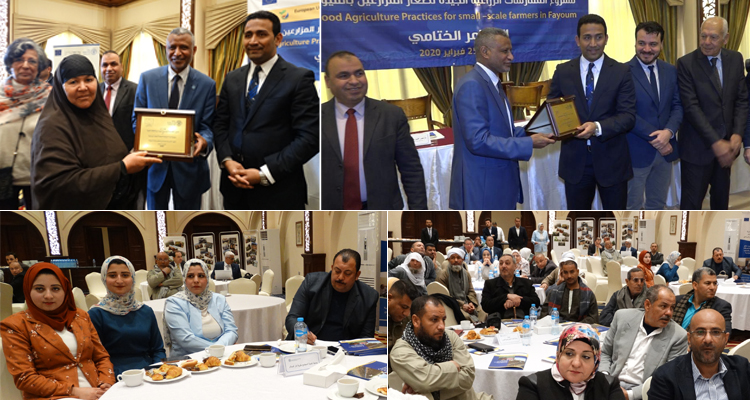1,400 beneficiaries and 6 associations’ for small farmers and rural women are the major outcomes of FAO-GAP Fayoum project

Fayoum, Egypt - With 1,400 direct beneficiaries and several thousand indirect beneficiaries, FAO concluded the "Good Agricultural Practices for Sustainable Improvement of the Quality and Quantity of Horticultural Production of Small-scale Farmers in Fayoum".
FAO implemented this project in cooperation with the Ministry of Agriculture and Land Reclamation, the Faculty of Agriculture at the University of Fayoum, the Horticultural Producers and Exporters Union and the Fayoum Organic Agriculture Development Association, with funding from the European Union's Joint Rural Development Programme, in coordination with the Italian Agency for Development Cooperation.
Participants of the project’s final workshop included representatives of The Governor of Fayoum, Dr. Ahmed ElAnsari, Secretary General and Deputy Governor, Dr. Mohamed Emad, Dr. Rabie Mohammed Mustafa, Undersecretary of Agriculture in Fayoum, as well as representatives of the European Union's Joint Rural Development Program, the Italian Agency for Cooperation and Development, beneficiaries and representatives of agricultural cooperatives, agricultural extension centers in the province, small farmers and media.
The project is considered as one of the milestones in the development process in the province for having succeeded in supporting the people of Dar ElSalaam, Fanous, Najib Sharq, Youssef El-Siddiq and Qasr Jebali, the targeted villages in Al-Fayoum governorate.
The most notable results of the project were:
- The establishment of five small farmers' associations in five villages, targeting 1,000 members (200 per village).
- Construction of five polyethylene agricultural greenhouses, five tunnels and training of 150 small farmers to produce horticultural seedlings and crops.
- Practical and field training of 1,400 farmers on good agricultural practices and techniques, including integrated pest control, water management, natural resource management, crop diversification and post-harvest, horticulture seedling production, greenhouse agriculture and tunnels.
- Five training workshops on adopting the proper use of fertilizers and biofertilizers for 240 small farmers in targeted villages.
- Small farms participate in hands-on deep tillage practices to improve the efficiency of the agricultural soil of 76 acres in the targeted villages.
- Application of the additional agricultural gypsum mechanism on 76.7 acres in the targeted villages, and the laser leveling mechanism in 21 acres.
- 200 soil sample analyses to improve soil fertility.
- 150 small farmers participated in 5 training courses on the production of vegetable seedlings in green houses in the targeted villages and the latter was distributed to small farmers (such as tomatoes, eggplants, cabbage and peppers).
- Training of 375 women from the targeted villages in the production of vegetable seedlings (tomatoes, cucumbers, eggplants, peppers, cabbage) and half a million seedlings were produced at the level of the five targeted villages and distributed to small farmers.
- Supporting a group of rural women in the establishment of the Rural Women's Association for The Development of Agricultural Business (Pioneers) (under establishment).
In his opening words at the closing workshop, Dr. Ahmed Al Ansari, Governor of Fayoum, said in a speech delivered on his behalf by his deputy, Mohammed Emad: "The training efforts obtained by the beneficiaries of the project should be utilized and shared with the rest of the farmers, where we are currently seeking to achieve integration. Between the directorates of agriculture and irrigation and the reliance on the application of good agricultural practices and modern irrigation systems, we call on FAO and the EU to continue to provide support and ensure that the integration component of the projects is achieved to include all the required components starting from soil analysis and selection process as well as marketing operations".
Nasreddine Haji Al-Amin, FAO representative in Egypt, said: “The project achieved many objectives and provided, the people of the targeted villages in Fayoum, the opportunity to benefit from modern agricultural techniques in the cultivation of their crops and agricultural products, which contributes to improving the living conditions of small farmers and improving their economic conditions, which comes in-line with FAO's objectives to end hunger and improve food security and standards of living".

The objectives of the project were to improve the livelihoods of small horticultural farmers in the five targeted villages in Fayoum governorate by increasing the competitiveness of their production, thereby improving their economic conditions by adopting a participatory development approach that encourages reliance on Good Agricultural Practices related to land and water efficiency among targeted small farmers.
Raphael Demoler, the EU’s Attache on Social and Rural Development, said: The European Union's joint rural development programme focuses on updating the value chain, developing irrigation systems, promoting geographical indicators of agricultural products and promoting good agricultural practices, emphasizing the strong participation of women that the project has developed. "One of the most notable achievements of the Good Agricultural Practices project in Fayoum is the establishment of an association whose members are rural women".
"This project has demonstrated from day one that many activities can be achieved on the ground at low cost and with innovative ideas that contribute to improving the standard of living and increasing income for farmers," said a representative from the EU-Joint Rural Development Programme - Egypt. All partners are satisfied with the project's achievements, and there are still several ongoing programmes for the EU such as the conservation programme in the areas of good agricultural practices and livestock production in the interest sought by the people of the province".
The EU-JRDP is an intervention for rural development under the umbrella of the European Neighbourhood Programme for Agriculture and Rural Development (ENPARD), an initiative launched by the European Union to translate its commitment towards inclusive growth and stability to include its neighbours. It is also implementing the European Union's Joint Programme for Rural Development (EU-JRDP) of the Italian Agency for Cooperation and Development (AICS). The cost of the programme is estimated at €21.89 million, which is fully funded by the European Union. The duration of the program is five years (2015-2019).
